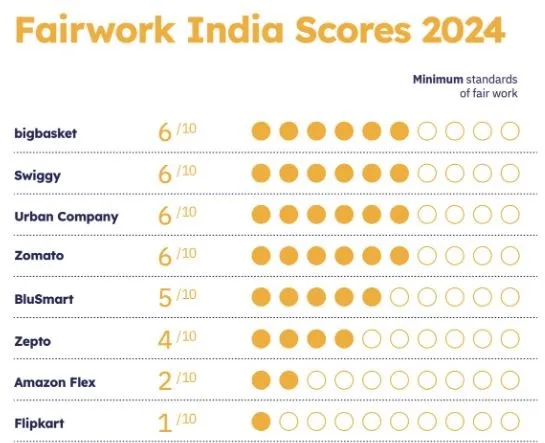Syllabus: GS3/Economy
Context
- The report titled ‘Fairwork India Ratings 2024: Labour Standards in the Platform Economy’ was released recently.
About
- It is the sixth consecutive annual study of this nature conducted by the Fairwork India Team in association with Oxford University.
- It analyses the work conditions of platform workers on digital labour platforms in India.
- Platform workers are those whose work is based on online software apps or digital platforms.
Major Highlights
- Fair Work assessed platforms against five principles: Fair Pay, Fair Conditions, Fair Contracts, Fair Management, and Fair Representation.
- The study evaluates 11 platforms offering location-based services in sectors such as domestic and personal care, logistics, food delivery, and transportation, in India.
- These include Amazon Flex, Bigbasket, BluSmart, Flipkart, Ola, Porter, Swiggy, Uber, Urban Company, Zepto and Zomato.
- Only Bigbasket and Urban Company were awarded the first point under Fair Pay for instituting a minimum wage policy.
- No platform earned the second point under Fair Pay, which requires platforms to commit to and ensure a local living wage after work-related costs.

- Representation through a collective body or trade union is a vital dimension of fairness at work.
- Despite the rise in platform worker collectivisation across the country over the past six years, there was insufficient evidence from any platform to show a willingness to recognise a collective body of workers.
Who are Gig Workers?
- Non-standard or gig work consists of income-earning activities outside of standard, long-term employer-employee relationships.
- It relies heavily on temporary and part-time positions filled by independent contractors and freelancers rather than full-time permanent employees.
- The term is borrowed from the music world, where performers book “gigs” that are single or short-term engagements at various venues.
- The gig economy uses digital platforms to connect freelancers with customers to provide short-term services or asset-sharing.
- Examples include ride-hailing apps, food delivery apps, and holiday rental apps.
India and Gig Economy
- In 2020, 7.7 million workers were engaged in the gig economy.
- The gig workforce is expected to expand to 23.5 million workers by 2029-30.
- At present about 47% of the gig work is in medium skilled jobs, about 22% in high skilled, and about 31% in low skilled jobs.
Reasons for a rise in Gig Workers
- Post Pandemic: The trend accelerated during the 2020 COVID-19 pandemic, as gig workers delivered necessities to home-bound consumers, and those whose jobs had been eliminated turned to part-time and contract work for income.
- Freedom to work from anywhere: These types of positions facilitate independent contracting work, with many of them not requiring a freelancer to come into an office.
- Rise of Technology and Internet: Rise of fast internet and smartphones have made it easier to work from anywhere easily.
- Convenient for Small Organisations: Employers who cannot afford to hire full-time employees to do all the work will often hire part-time or temporary employees to take care of busier times or specific projects.
- Benefits Employers: Employers do not need to provide related benefits, such as medical insurance, Provident Fund, and year-end bonuses which make it a better option for them to pay only for work on a unit basis.
Challenges
- Work-life balance: For some workers, the flexibility of working gigs can actually disrupt the work-life balance, sleep patterns, and activities of daily life.
- Can replace Full time employees: The number of full-time employees required by the company can be reduced as freelance workers take over the work.
- No regular job benefits: Many employers save money by avoiding paying benefits such as health coverage and paid vacation time.
- There is no formal employment relationship with the platform company and there are usually no employee benefits in short-term contracts.
Steps Taken by Government of India for Gig Workers
- Code of Social Security, 2020: The Government has formulated the Code on Social Security, 2020 which envisages framing of suitable social security schemes for gig workers and platform workers on matters relating to life and disability cover, accident insurance, health and maternity benefits, old age protection, etc.
- However, these provisions under the Code have not come into force.
- e-Shram Portal: The Government has also launched e-Shram portal in 2021 for registration and creation of a Comprehensive National Database of Unorganized Workers including gig workers and platform workers.
- It allows a person to register himself or herself on the portal on a self-declaration basis, which is spread across around 400 occupations.
Source: TH
Previous article
The 2024 Forest Declaration Assessment Report
Next article
2024 Nobel Prize in Physics